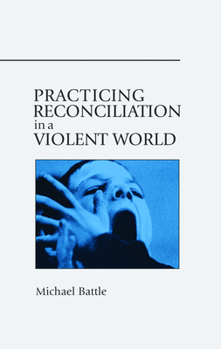Practicing Reconciliation in a Violent World
How do we practice reconciliation in a world full of violence? How do we love someone at work who seems hell-bent on sabotaging a successful career? And how do religious people resolve differences when religious interpretations seem to lead to righteous indignation rather than reconciliation?
Format:Paperback
Language:English
ISBN:0819221090
ISBN13:9780819221094
Release Date:August 2005
Publisher:Morehouse Publishing
Length:119 Pages
Weight:0.40 lbs.
Dimensions:0.3" x 5.5" x 8.5"
Customer Reviews
2 ratings
Practicing reconciliation
Published by Thriftbooks.com User , 17 years ago
This is an eloquent and evocative book, written from the perspective of an African American who is the Associate Dean of Academic Affairs at Virginia Theological Seminary and who in the past worked with Desmond Tutu in South Africa. I was perhaps lest interested in the typology of reconciliation, and more interested in the author's personal history and his meaningful concept of "inhabiting reconciliation." Practicing reconciliation in a violent world invites hope when the news on TV is too often an invitation to despair.
Wonderful and helpful book for all those who work for peace
Published by Thriftbooks.com User , 18 years ago
This is a wonderful and helpful book for all those who work for peace and seek reconciliation in their lives, in their communities, their churches, and in our world. Michael Battle presents a helpful survey tool which aids self-understanding in the area of peacemaking. An underlying assumption is that we all are peacemakers, but may understand this differently and may engage this work in a variety of ways. In terms of using this survey in a peacemaking group, or congregational or religious community, I find this to be a very interesting tool. I have had several experiences with personality type inventories, spirituality type inventories and the like but have not seen one that gets at personality as it relates to nonviolence. I think for peacemakers and religious communities it is essential and could strengthen us if we had a greater sense of who we each are, and where we stand, and what our own contexts and modes of thinking actually are. For example, I have seen a congregation who agreed to protest war (in this case, the first Gulf War), but there was great disagreement about whether to march, to pray, to have a vigil, to write letters to congressmen, to do direct action and force arrest. In the end, little was done, and it took time for the congregation to heal from its conflict over a response to the war. A tool such as this might lead to greater mutual understanding, and more effective peacemaking.





